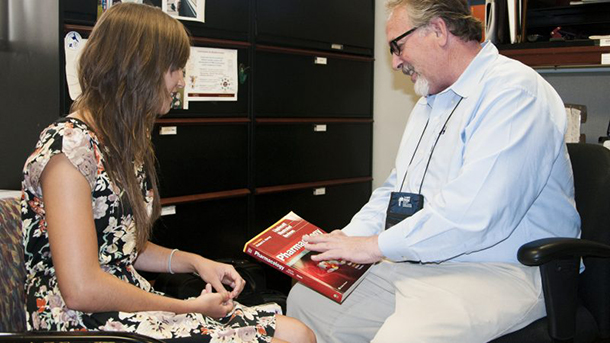Just as pharmacists compound medications to personalize them for patients, the USC School of Pharmacy now offers many undergraduate courses that can be mixed or matched to enhance the students’ undergraduate education to better prepare them for a range of careers.
While completing the third year of her bachelor’s degree in chemical engineering, Rebeca Thweatt realized that a pharmacy minor would sharpen her biochemical focus. Wanting to add knowledge about pharmacology, regulatory science and pharmaceutical industry realities to her academic arsenal, she decided to take advantage of the school’s recently added undergraduate minor in Science and Management of Biomedical Therapeutics.
After meeting with Regulatory Science Program Administrator Randa Issa, PhD, and Professor Daryl Davies, the School of Pharmacy’s Director of Undergraduate Education, Thweatt declared an interdisciplinary second major. The new pathway augments her education at the Dornsife College of Letters, Arts and Sciences with solid groundings in pharmacology and crucial information about how to push medical innovations from initial idea to the marketplace.
“The courses have a lot of promise for students looking to get into the pharmaceutical industry because they provide opportunities for undergrads to not only learn regulatory science, but to also build connections with faculty who have worked in the business,” said Thweatt, who wants to devise new medications and novel therapies.
“The minor is relevant for various pre-health tracks,” added sophomore Jacqueline Parizher, “because pharmaceuticals are a major part of the health industry in general.”
Parizher, who is majoring in human biology, said she enjoys taking the new courses offered as part of the minor because “I can take the knowledge I have gained from my introductory science courses and see how it applies to pharmacology.” She also appreciates “the faculty’s excitement in teaching these courses and their willingness to help us learn while keeping us from being intimidated by the volume of information.”
Senior Nick Tran, a biochemistry major, is using the minor as a step toward his goal of becoming a clinical pharmacist. “Before I officially declared the minor or even attended a class, just reading through the syllabus of the “Human Pharmacology: Challenge of Therapeutics in Society” course and seeing the variety of fascinating topics was enough to sell me,” he said.
He has not been disappointed. “Dr. Davies, Dr. Michael Jakowec and Dr. Naomi Florea teach courses with a direct clinical approach. We are expected to integrate the information learned in class to solve challenges presented in clinical scenarios.”
The education provided also extends beyond the theoretical. “We obtain hands-on experience, such as measuring our classmates’ blood pressure during Dr. Florea’s guest clinical lectures,” Tran said.
The minor also has broadened Tran’s interests. “Although I was originally drawn to the pharmacology classes in the minor, Dr. Eunjoo Pacifici’s course ‘Globalization of the Biomedical Industry,’ which examines how pharmaceuticals and medical devices are developed and regulated worldwide, has not only taken me outside the bubble of living in Los Angeles and California, but also beyond my mostly science-based education.”
While Thweatt, Parizher and Tran want to pursue careers related to pharmacy, the school offers undergraduate courses that can bolster a variety of career tracks.
Aspiring authors and historians, as well as budding scientists, may enjoy the perspectives on toxicology provided by “Mysterious Deaths: History of Poisons in Literature” (RXRS 209). Future social workers, lawyers and law enforcement officials can join their peers in the life sciences and pre-medicine in benefiting from “Pharmacology and Sociology of Drug Abuse” (RXRS 405). Those who want careers in public policy or consumer protection can gain a solid grounding with “Food Safety: The Good, The Bad and The Deadly” (RXRS 417).
These are just a few examples of the broad spectrum of School of Pharmacy courses that are available for undergraduates across USC.
In addition to the current list of exciting courses, additional new courses are in development for students to take in 2018, including “Pharmacology and Drug Development,” “Organ Physiology, Drug Delivery, and Drug Action,” “Clinical Pharmacology and Medication Management” and “Twenty First Century Medical Issues and the Law.”
For students’ convenience, all pharmacy undergraduate courses are taught on USC’s University Park Campus. For more information about taking one class or supplementing your major with a minor, visit classes.usc.edu. Students who are interested in learning more about the Science and Management of Biomedical Therapeutics minor may contact Randa Issa at (323) 442-2018 (rissa@usc.edu).
Students: Drop Dr. Davies (ddavies@usc.edu) an email – he loves talking about all of the exciting courses the School of Pharmacy is offering.
— Susan Wampler


